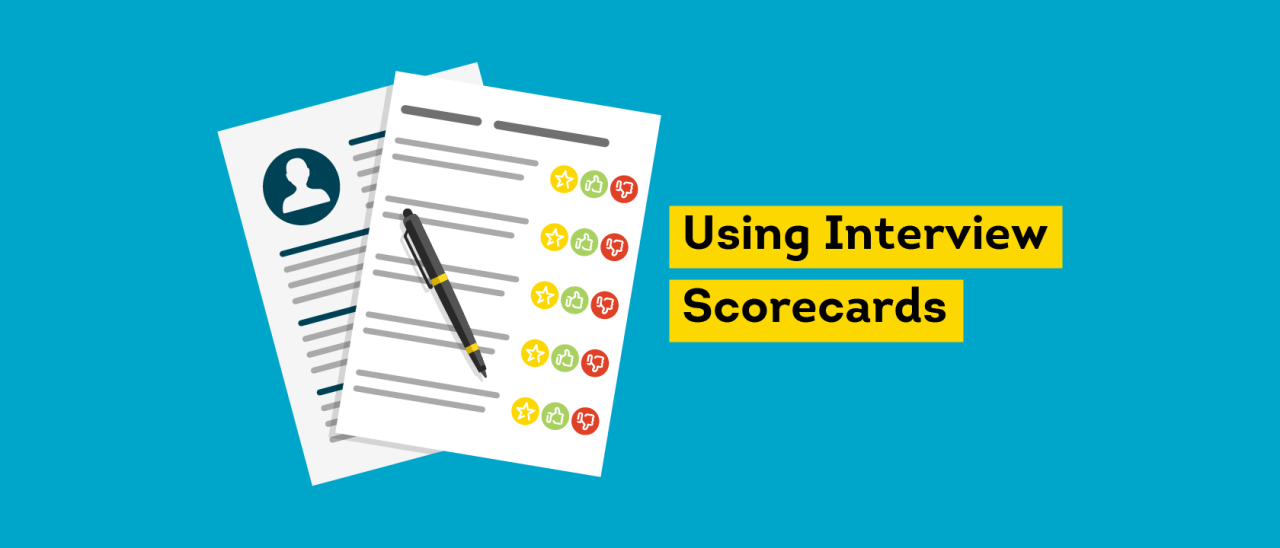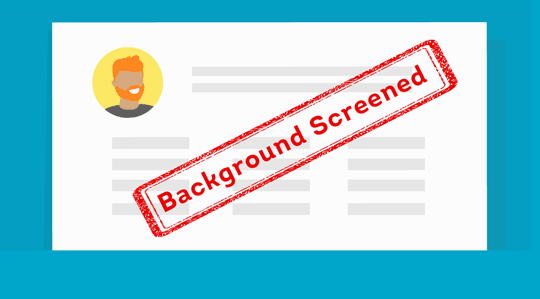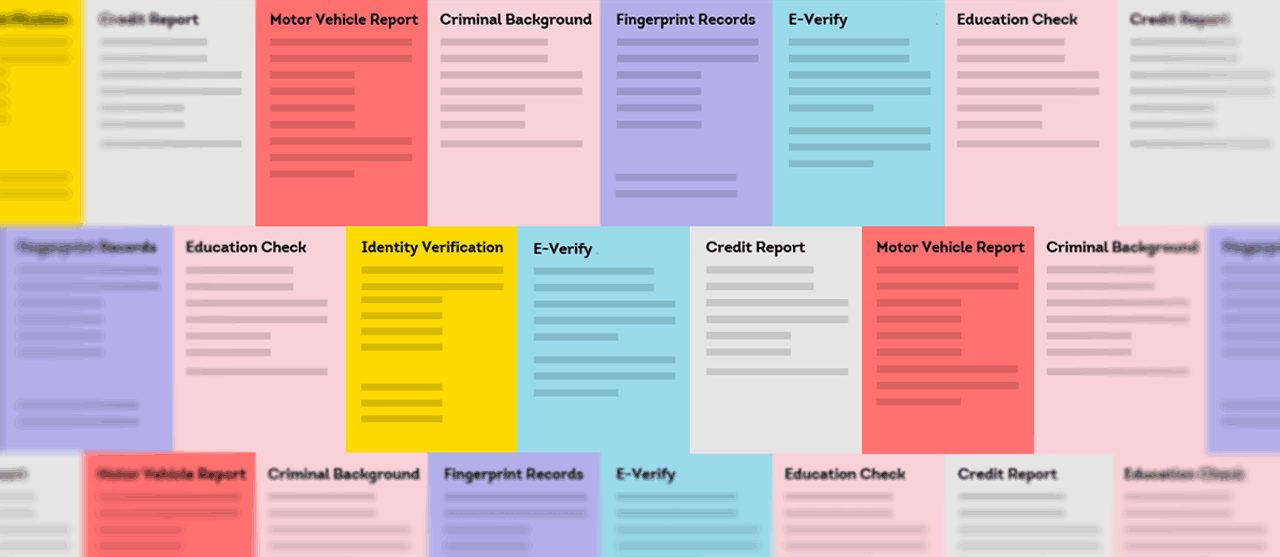Interviewing a job candidate is a lot like judging an Olympic gymnastics routine: you sit behind a table, watching a top competitor do their best to wow and dazzle you with all the right stuff. In the end, you’re left to decide who didn’t make the cut and who will be rewarded with the open position.
Unlike an Olympic judge, you have a lot to lose if your candidate doesn’t stick the landing. As a small business owner or hiring manager, recruiting and retaining top-tier employees is a high-stakes game that should be among your top priorities. After all, a long, drawn-out hiring process can be devastating to your bottom line. In addition to the expense and effort it takes to run a search for a new hire, interviewing multiple candidates can translate to overworking your current employees, declines in productivity, decreased satisfaction, and the frustration of wasted dollars.
Even if you have a great pool of talented competitors, narrowing it down to just one hopeful can be a lot harder than it sounds. According to Jobvite, the average conversion rate from interview to offer is only 17%, which translates to five interviews for every job offer. With those odds, how do you ensure you’re selecting the right person for the job?
As is often the case, the answer lies in high-quality data. Interview scorecards may help hiring committees rank and evaluate candidates objectively, which then makes it easy to compare applicants and compile a winning shortlist. Such rubrics can make your hiring process run more smoothly and can give you more confidence that your top choice truly stands away from the pack.
However, the need for quality information doesn’t end in the conference room. After judging top candidates with an interview scorecard, it is essential to vet their background and credentials through a comprehensive employee screening service like TransUnion ShareAble for Hires. Knowledge is power; knowing that your candidate outranks the competition with interview scorecards and high-quality screening can help you feel more confident about your hiring decisions.
What are Interview Scorecards?
Interview scorecards are, in sum, a simple and effective way to evaluate job candidates in the interview stage of a hiring process. With interview scorecards, candidates may be effectively ranked on how well they respond to a consistent set of interview questions.
Many interview rating scales use numbers or icons to identify how positively or poorly the candidate answered. You can use standardized interview scorecards or customize them to reflect your company culture and hiring expectations.
A basic interview scorecard template may include a range of questions with a corresponding section for interviewers to evaluate how the candidate responds to each question. The scorecard can then be used as a rubric to guide further interview questions and as a place to express final thoughts about a candidate.
Advantages of Using Interview Scorecards
Using a candidate evaluation system like scorecards is one of the best tips to reduce risky hires, but they can actually bolster your hiring process in a number of other ways, too. Some advantages of using interview scorecards can include:
- Improves focus in interviews
- Establishes a standardized, documented process
- Allows multiple panels to share thoughts on candidates in an organized manner
- Keeps hiring criteria in perspective
- Creates a more objective interview process
- Helps speed up long interview processes
All of these advantages can create efficiencies in the hiring process. As a small business owner or hiring manager, you know the value of such efficiency—especially when you’re working with a small staff or on a minimal budget.
According to a hiring FAQ published by Workable, the average interview and hiring process is 42 days. Although these timelines can vary greatly by industry, spending multiple months on a hiring process can be a huge hit to small businesses. Good data collection practices—such as interview scorecards and well-documented screening—can help expedite the hiring process and prevent problems down the line.
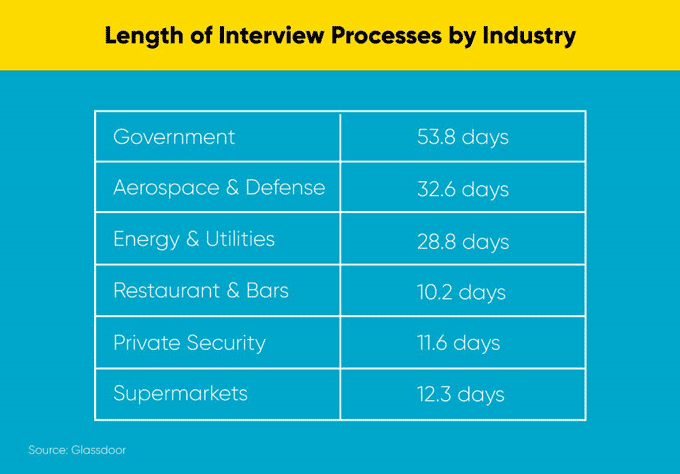
Regardless of industry, if you need to hire quickly, lengthy interviewing processes can be detrimental to your bottom line. It’s important to keep interviews short and focused. A face-to-face interview typically lasts between 45 minutes to an hour, which is should be sufficient time for a group to get a good read on a candidate.
If your existing employees spend too much time conducting interviews, then they will have less time to do their work and you can lose out on productivity. Interview scorecards can help to keep interview questions focused, and outline criteria that will help you make quicker decisions about the candidates you’re most excited about.
Disadvantages of Using Interview Scorecards
While there are plenty of advantages to interview scorecards, there are a few drawbacks to keep in mind as well. Some hiring managers may choose not to use scorecards because they:
- Take time to create and prepare
- May limit eye contact during interviews
- Can be too formal for companies who prefer more conversational interviews
- Might encourage the hiring committee to consider only the score and not the candidate as a whole
Despite the potential disadvantages of using interview scorecards, with the proper training, they can still be an excellent tool for hiring managers and interview panels. Here are a few tips that can help you combat these drawbacks (and you should consult your Human Resource and Legal departments with respect to applicable laws):
- Although the setup process may sound cumbersome, there are plenty of interview scorecard templates you can download to get you started. An upfront investment of time can be well worth the hassle.
- To deal with limited eye contact, be transparent with your candidates and let them know you will be taking notes ahead of time. If you’d prefer not to take extensive notes during the interview, consider using something like a candidate evaluation form, which allows interviewers to assess candidates after the interview, instead of during.
- If interview scorecards feel too formal for your process, then let interview panels know that they have the freedom to ask their own questions in addition to what’s on the scorecard, time permitting.
- Make it clear with interviewers from the start that scores are just part of a candidate’s qualifications and might not reflect the final decision.
Tips on How to Use Interview Scorecards
Although it can take some time to develop interview scorecards that suit your process, using them is simple and helpful. Here are some tips on how to use interview scorecards:
- Delegate questions to different team members to make the interview more engaging for everyone involved. This also helps to eradicate duplicate questions throughout the interview process and gives everyone a chance to talk to a potential new co-worker.
- Encourage interviewers to follow questions in order and rate interviewee responses as they go. Make it clear if follow-up questions are allowed.
- Prompt interview panels to include a short summary of their thoughts on the prospective hire after the interview is complete. Remind interviewers to remain professional and on the topic in their reflections. If a candidate claims they were discriminated against in the hiring process, they may be legally eligible to review all interview notes and other hiring committee materials.
- Collect all scorecards and use them to help guide your hiring decision. You might also need to retain such hiring materials for legal compliance, according to your HR policies and local regulations.
After the candidate completes the entire interview process, hiring managers should collect all scorecards from each of the interviewers and review their responses. Ultimately, the hiring manager is (usually) the one responsible for selecting the candidate they think is best suited for the position, but getting input from other team members can certainly help solidify your final hiring decision. Go over the results of the scorecards as a group if there are any significant differences in opinion.

If you’re between a few different candidates and intend to hire for additional positions later on, then you might want to file top candidate scorecards away for future reference. As for your preferred candidate, you can include interview scorecards in their file in case you need to refer back to them later (it is recommended that you consult your Human Resources and Legal departments).
After you’ve selected a candidate that’s fit for the job, you’ll want to run a pre-employment screening in order to verify their employment history, criminal record, and other relevant details. This step complements your interview screening, as it helps you to evaluate applicants further and minimizes the risk of hiring someone that’s not right for the position, or for your company as a whole.
Interview Scorecard Examples
How you use interview scorecards depends entirely on your organization’s preferences and your hiring criteria. That said, there are some standard templates that can help you design a scorecard that fits your needs.
If you’re not sure where to start with questions, start by thinking about what you consider to be the required expertise of the position and the top qualities of a good employee. If you need someone with great communication, then ask how they would handle a particularly challenging interpersonal issue on their team. Or perhaps you find the most value in employees who are prepared to excel within the organization. In this case, ask them how they showed initiative in their last job and where they’d like to see their career development in the future. Avoid asking simple yes or no questions and instead focus on quality questions that require interviewees to provide examples of past situations in which they failed or flourished. And always consult your legal counsel for permitted questions.
Here are some examples of interview questions to help get you started:
- What do you like about our company? What are you excited about working on?
- What is your greatest professional strength and how have you leveraged that strength in the past?
- What quality do you consider to be your weakness and what have you done to improve on it?
- What would you consider to be your ideal work environment?
- How would you describe your communication and collaboration style?
- Provide an example of a time when you had to have a difficult conversation at work. What happened and how was it resolved?
- Where do you see your career in five years? Ten years?
- What has been the greatest challenge you’ve faced in your career and how have you worked with it?
- Who was your favorite manager and why?
- How would your former colleagues describe you?
- Give an example of a time you disagreed with a superior at work. How did you handle the situation?
- Provide an example of a stressful situation at work. What happened? How did you manage it?
- How do your values align with those of our organization?
- What do you like to do outside of work for fun?
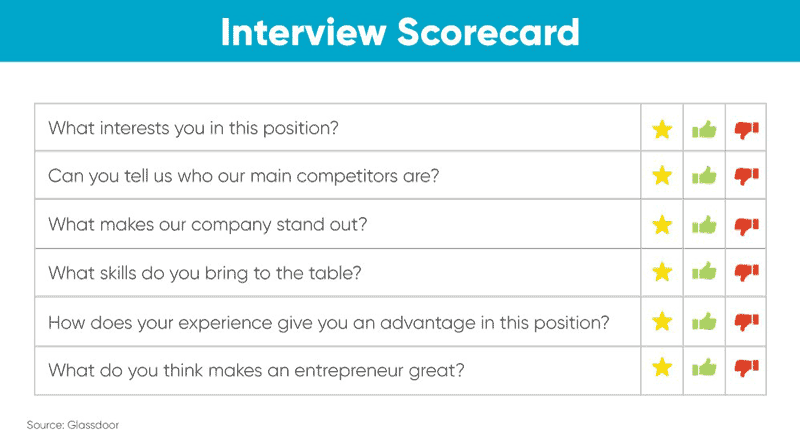
Standardized Interview Scorecards
Using a standardized interview scorecard template is one of the most efficient ways to get an interview process up and running; however, depending on the position you’re hiring for, you may want to tailor your scorecard to match your hiring criteria.
If you’re hiring for a financial analyst, for example, you may want to include questions about their experience managing financial accounts and ask for examples of successes and failures. If you’re hiring for a sales position, then you may want to focus your questions on how a candidate has secured challenging sales in the past. Use the questions provided in this post as a starting point to build your own interview scorecard sheet that best suits your hiring process.
Make More Confident Hiring Decisions with Quality Screening
Interview scorecards can be an excellent solution for small businesses to streamline their interview process. Asking constructive questions helps catapult great candidates from your shortlist into open positions. By combining interview scorecard templates with your own unique questions and personality, you can create an interview process that’s agile, reflective of your company culture, and most importantly, effective. That said, narrowing down your candidate list with a scorecard is only part of the game. Once you have a fit competitor, it’s time to put them to the test with thorough employment screening from a trustworthy provider.
Built specifically for small businesses, ShareAble for Hires provides comprehensive employee background screening that can help you feel more confident about your hiring decisions. With a variety of on-demand screening options, you can confirm your applicant is who they say they are in a matter of minutes.
With identity verification, get an easy-to-read report that compares the personal information your candidate provides with information on file with government authorities, such as the Social Security Administration. This can give you the peace of mind that what they shared about themselves on the application was, in fact, true. If you’re hiring for a position that involves managing budgets or has financial oversight, then running a credit check can also help you see for yourself if your candidate is as responsible with money as they claimed during the interview.
In the hiring process, candidates aren’t always forthcoming about colorful pasts that could impact your business. However, with a criminal background check through ShareAble for Hires, you can run your candidate’s information through a variety of national and state-wide criminal databases, like the FBI’s Most Wanted, as well as conviction, arrest, and court records, and see if there are any matches. Backed by TransUnion, a major national credit reporting agency, ShareAble for Hires provides comprehensive reports you can trust.
Whether judging candidates with interview scorecards or with employee screening, high-quality data is essential to making a more confident hiring decision. Just as Olympic judges test top athletes for performance enhancers, it’s your job to make sure there are no red flags lurking under the surface of your fantastic candidate. Make your job easier with ShareAble for Hires.
